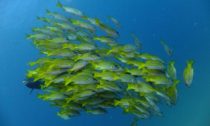
07.00 morning dive. <30 minutes bottom time
Saw Large schools of Yellow banded snappers, Emperor Angel fish x 2
Healthy reef
Andyshine
Read More

07.00 morning dive. <30 minutes bottom time
Saw Large schools of Yellow banded snappers, Emperor Angel fish x 2
Healthy reef
Andyshine
Read More09.00 morning dive. 40 -50 minutes bottom time.
Saw large Loggerhead turtle 1,5m long, honeycomb moray eel 1,5m long x 2
Andyshine
Read More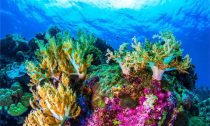
Scientists say bolder actions to protect coral reefs from the effects of global warming will benefit all ecosystems, including those on land. In an article published in Nature today two researchers from the ARC Centre of Excellence for Coral Reef Studies at James Cook University (Coral CoE at JCU) say the world’s reefs will disappear by 2070 if climate change continues on its current path. Even well-protected World Heritage-listed coral reefs have been increasingly damaged by regional and global bleaching since 1980.
Prof Tiffany Morrison and Prof Terry Hughes suggest a new, holistic approach to safeguarding coral reefs by focussing on land as well as the ocean.
“We must take a new, bolder approach to tackle the underlying causes of coral reef decline,” lead author Prof Morrison said...

Extreme events linked to climate change, such as the heatwave in Europe this year, are occurring sooner than expected, an ex-chief scientist says. Prof Sir David King says he’s been scared by the number of extreme events, and he called for the UK to advance its climate targets by 10 years.
But the UN’s weather chief said using words like “scared” could make young people depressed and anxious.
Campaigners argue that people won’t act unless they feel fearful.
Speaking to the BBC, Prof King, a former chief scientific adviser to the government, said: “It’s appropriate to be scared. We predicted temperatures would rise, but we didn’t foresee these sorts of extreme events we’re getting so soon.”
He said the world had changed faster than generally predicted in the fifth assessment ...
Read More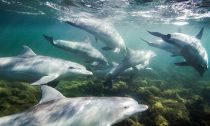
Dolphins living in the English Channel are exposed to a “cocktail of pollutants”, say scientists. A study found some of the highest recorded levels of toxic chemicals and mercury in the bodies of bottlenose dolphins off the French coast.
Researchers say more needs to be done to tackle the “invisible” problem of lingering pollutants in the oceans.
The Channel is home to one of the last remaining large European populations of bottlenose dolphins.
Researchers took tissue samples from more than 80 dolphins living in waters off Normandy and Brittany.
They found high concentrations of mercury in skin and polychlorinated biphenyls, or PCBs, in blubber.
Other industrial chemicals, such as dioxins and pesticides, were also found in blubber samples, which together may act as a “cocktail of pollutan...
Read More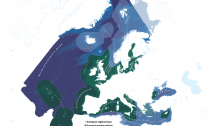
Only a fraction of the marine areas meant to be protected by the European Union are being properly conserved at present, according to a new report. The research – by the World Wide Fund for Nature and Sky Ocean Rescue – says less than 2% of the EU’s waters are being properly managed, compared to the target of over 12%.
Janica Borg from the World Wide Fund for Nature told Euronews’ Good Morning Europe that the aim of the protected areas is very important:
“The aim of protected areas is to conserve biodiversity so that we can ensure that the oceans are conserved for future generations.
“Not only that, it’s also important for a stable blue economy; this means greater use of marine sectors and is something the EU is currently developing.
“Currently, there’s good intentions for protection...
Read More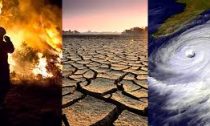
Investing $1.8 trillion over the next decade – in measures to adapt to climate change – could produce net benefits worth more than $7 trillion. This is according to a global cost-benefit analysis setting out five adaptation strategies.
The analysis was carried out by the Global Commission on Adaptation – a group of 34 leaders in politics, business and science.
They say the world urgently needs to be made more “climate change resilient”.
The commission, led by former UN Secretary-General Ban Ki-moon, World Bank chief executive Kristalina Georgieva and Microsoft co-founder Bill Gates, argues that it is an urgent moral obligation of richer countries to invest ...
Read More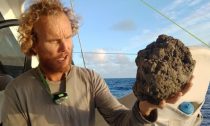
A vast “raft” of volcanic rocks stretching over 150 sq km (58 sq miles) is drifting through the Pacific Ocean, scientists say. The sea of pumice – the size of 20,000 football fields – was first reported by Australian sailors earlier this month.
Experts say the mass probably came from an underwater volcano near Tonga which erupted around 7 August according to satellite images.
Sailors have been warned to stay clear of the potential hazard.
Pumice is a lightweight, bubble-rich rock that can float in water. It is produced when lava goes through rapid cooling and loss of gases.
Large “rafts” of the volcanic rock are more likely to form when a volcano is located in more shallow waters, say experts.
An Australi...
Read More
It’s a historic week for climate change in the Democratic Party.
In the same 12-hour span, Senator Bernie Sanders unveiled his plan to pass a gargantuan $16 trillion Green New Deal as president, while Governor Jay Inslee of Washington—who ran an unprecedented, bluntly climate-focused campaign—dropped out of the 2020 primary.
Then, this afternoon, the Democratic National Committee rejected a proposal to hold a climate-centered debate in the primary—even though nearly every candidate had endorsed the idea.

The world will have an additional 2 billion people to feed over the next 30 years – and doing that without decimating the planet’s resources will require exploring as many options as possible. Yet, a significant option – seafood – is often overlooked in global food security planning and discussions about future diets.
Stanford Report spoke with Jim Leape, co-director of the Stanford Center for Ocean Solutions, and Rosamond Naylor, the William Wrigley Professor in Earth System Science, about integrating oceans into a sustainable and equitable food future...
Read More
Social Profiles